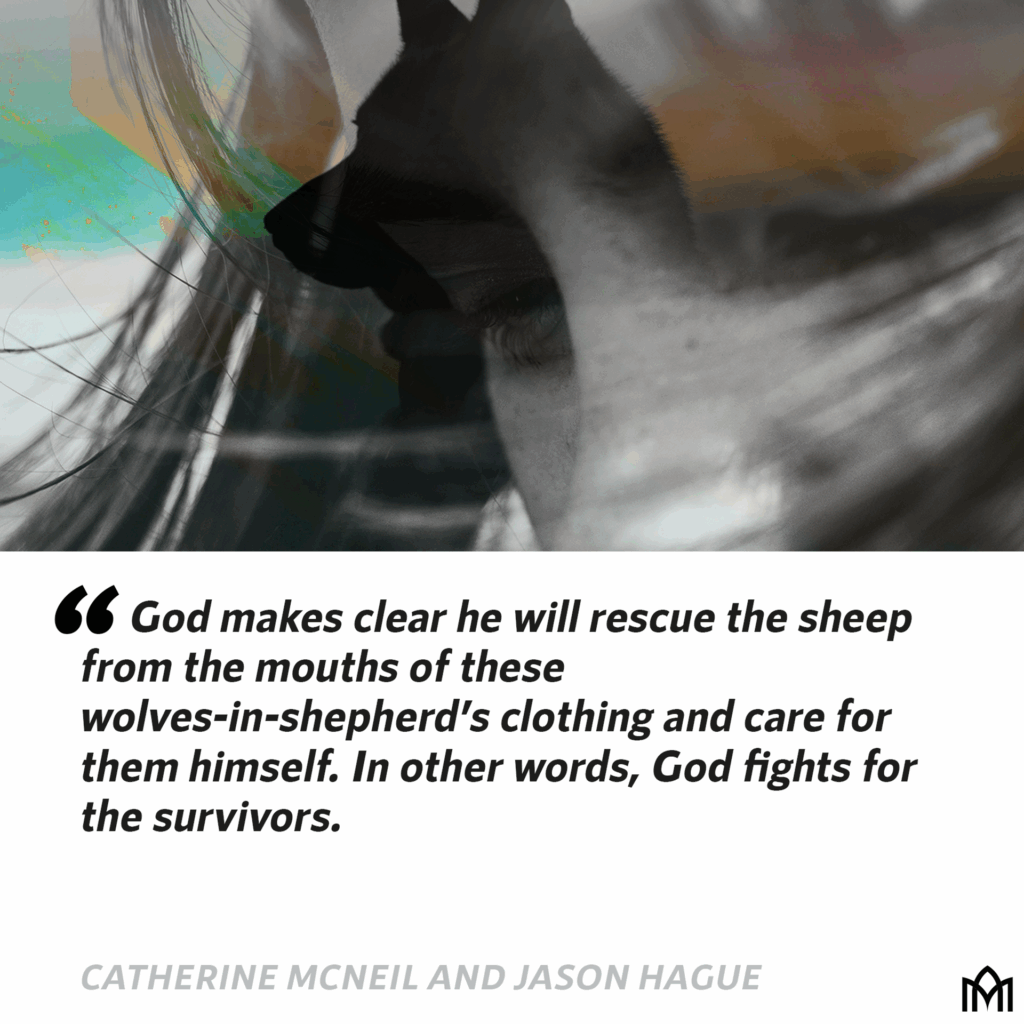Wolves in Shepherd’s Clothing
Catalysts for Faith Crisis, Pt. 1
“Another Christian leader unmasked as an abuser!” the news headlines shouted earlier this week. There’s no need to go into the spectacular specifics of who and why and to what extent. No matter when you read this article, it’s likely that another Christian leader has recently been unmasked as a wolf, not a shepherd. The headline is increasingly evergreen.
When we wrote Mid-Faith Crisis, Jason and I (Catherine) paid close attention to the myriad reasons Christians begin questioning their long-held beliefs, why they feel compelled to leave beloved communities of faith. Among the many stories we heard, this one came up again and again: The people we trusted to lead, teach, and protect us turned out to be abusers. It was all a lie—or worse, a con. The shepherd was unmasked and found to be a wolf.
This kind of disillusionment hits close to home for Jason, who wrote about the profound impact Ravi Zaccarias had on his spiritual formation. Though they never met, Ravi’s influence felt personal. Jason devoured his lectures and podcast episodes and studied his public speaking. He was formed by this older, seemingly wiser shepherd. When the evangelist died in 2020, Jason posted, “Thank you Ravi. For making the truth beautiful.”
Of course, the ugly truth came out shortly after. The famed evangelist had for years lived a double-life of evil, abusing women all over the world, leaving a trail of shocked and broken followers in his wake.
Ultimately, Jason’s faith survived.1*Editorial Note: Jason talks more about the personal effects of Ravi’s scandal in the fifth chapter of Mid-Faith Crisis, which is entitled, ‘When Our Heroes Fell.’ ~CK But faith is often shipwrecked on the rocks of these scandals. And when it is not a celebrity who is unmasked but a close friend, pastor, or mentor—the person we believed to be the hands and feet of Jesus, the voice teaching us how to find the way, the truth, and the life—the betrayal is personal and visceral.
And it is disorientating. How do we even begin to know which end is up after something like this?
But the betrayal doesn’t end there. Those who try to blow the whistle—or simply ask for help—are regularly told to keep silent, to push past the pain, to forgive and forget. Publicity could hurt the Church, the ministry. The implication is that victims and survivors of abuse need to keep quiet for the sake of God and the gospel.
When a close friend, pastor, or mentor is unmasked—the person we believed to be the hands and feet of Jesus, the voice teaching us how to find the way, the truth, and the life—the betrayal is personal and visceral. Share on X
But what does the Bible suggest God wants in these situations?
If we need a prophetic light to shine a path out of our disorientation, Ezekiel 34 is a great place to start. God’s prophet does not mince words as he eviscerates those who were entrusted to care for God’s sheep but cared only for themselves, who consumed or exploited the sheep rather than fighting to protect them, who left the sheep vulnerable to the wolves:
“This is what the Sovereign Lord says: Woe to you shepherds of Israel who only take care of yourselves! Should not shepherds take care of the flock?…I am against the shepherds and will hold them accountable for my flock. I will remove them from tending the flock so that the shepherds can no longer feed themselves. I will rescue my flock from their mouths, and it will no longer be food for them.” (Ezekiel 34:2b,10, NIV)
These predator-shepherds failed their most basic responsibilities: they neglected to nurture their flock, care for the sick and restore the lame; they did not search for the sheep who were lost. Rather, they exploited the vulnerable. They not only harmed the sheep but left the flock more vulnerable to other predators.
It sounds familiar, doesn’t it? We don’t need to be farmers to see a clear parallel to our own church and ministry cultures today. We understand what God is saying through Ezekiel all too well.
Yet there is no sense that the wounded flock should quietly keep their mouths shut, or receive these shepherds back after a time of repentance. No, God says “Woe to you” and vows to remove the false leaders so thoroughly that they won’t be able to feed themselves. God makes clear he will rescue the sheep from the mouths of these wolves-in-shepherd’s clothing and care for them himself.
In other words, God fights for the survivors. God is on the side of the wounded and vulnerable—not on the side of the false teachers. We don’t need to keep quiet to protect God or God’s mission—God’s mission is to loudly fight to protect the flock from the wolves.
In John 9, we see Jesus heal a man who had been blind since birth, who’d been begging for bread in the same spot for years. Yet rather than celebrating this act of God, the leaders of the synagogue grew angry because Jesus healed him on the Sabbath. They called the man in to interrogate him, and he told the truth: Jesus did this. So what did the man’s fathers in the faith do in response? They threw him out of the synagogue. Out of fellowship. Out of good standing within his community.
Simply because Jesus had healed him.
God is on the side of the wounded and vulnerable—not on the side of the false teachers. We don’t need to keep quiet to protect God or God’s mission—God’s mission is to loudly fight to protect the flock from the wolves. Share on X
But the story doesn’t end there. In chapter 10, Jesus finds the man. In earshot of the same leaders who had casted him out, Jesus does not tell the man to forgive the betrayal or lecture him about ‘flawed but called’ human leaders. No, Jesus sides with the man who has been outcast.
Everyone can hear Jesus as he begins a speech referencing the same passage in Ezekiel 34 about shepherds who come like thieves to steal, kill, and destroy, excoriating the cruelty of religious shepherds who abuse their sheep.
Jesus is not being subtle in his references. I am the Good Shepherd, Jesus declares. I am the door to safety for the flock, to fellowship and abundant life. These men? These wicked shepherds who exiled the man born blind rather than celebrate his healing? They are the thieves.
The story mirrors Jesus’ general attitude toward wicked religious leaders who reveled in their reputation as holy men but cared nothing for those under their care. “You ‘shut the door of the kingdom of heaven in people’s faces’” Jesus declared. “You snakes! You brood of vipers! How will you escape being condemned to hell?” (Matthew 23:13,33)
Turns out, the Bible is pretty direct and specific about what God feels and does when a shepherd knowingly and repeatedly harms the sheep to feed himself.
If you have been harmed and betrayed, if your faith has been shaken by men and women you trusted to speak for God, know this: Jesus sides with you. He aches with you and he fights for you. God does not need abusers to keep preaching or serving in order to be glorified—God is glorified by snatching his true sheep from their mouths and sending the false teachers away empty.
And you need not push aside your pain to arrive at platitudes and party lines. Instead, you might need to sit outside with Jesus for a while.
And for those of us growing numb to the endless headlines and exposés, it may be time for us to sit down with the hurting and listen to their anguish. In their depths of disillusionment and brokenness, they may be closest of all to the heart of Jesus.
///
*Editorial Note: The second piece in Catherine and Jason’s Catalysts for Faith Crisis series, entitled “Unanswered Prayer,” can be read here.
If you have been harmed and betrayed, if your faith has been shaken by men and women you trusted to speak for God, know this: Jesus sides with you. He aches with you and he fights for you. Share on X




